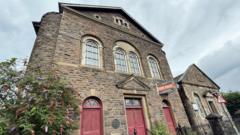Can the Cwm Rhondda Chapel Be Saved with Fundraising Efforts?

A Campaign to Save the Chapel of Cwm Rhondda: A Community Triumph
The recent campaign to save the historic Capel Rhondda, where the iconic hymn "Cwm Rhondda," also known as "Bread of Heaven," was first sung, has captured the hearts and minds of many. The chapel, located in Hopkinstown, Rhondda Cynon Taf, was put up for sale by the Welsh Baptist Union for £47,500 after its last service in December 2024. This article explores the significance of the chapel, the campaign led by local resident Rhian Hopkins, and the broader implications for Welsh heritage.
Historical Significance of Capel Rhondda
Capel Rhondda holds a special place in Welsh culture and history. The hymn "Cwm Rhondda" was composed by John Hughes and first sung in this chapel just before Christmas in 1907. It has since become a staple in Welsh choral music, resonating with themes of hope and spirituality. The hymn is not only significant to the local community but also represents a crucial aspect of Welsh identity, often sung during national events and gatherings. The chapel, therefore, is not merely a building; it symbolizes a rich cultural heritage that has been passed down through generations.
The Campaign: A Community Effort
When the chapel was placed on the market, many locals feared that it could be sold to a property developer, leading to its potential demolition or repurposing. Rhian Hopkins, a community member who grew up in the village, recognized the importance of preserving this landmark. She launched a crowdfunding campaign that quickly gained traction. Within less than two weeks, the campaign raised approximately £55,000, surpassing its initial target of £47,500. The new target of £60,000 was set to cover legal fees and other associated costs.
A Vision for the Future
Rhian Hopkins expressed her amazement at the support received, stating, "It's amazing." Her vision extends beyond just saving the building; she hopes to transform Capel Rhondda into a museum and visitor center dedicated to the hymn's heritage. However, the journey is just beginning. Significant restoration work is required, with estimates indicating that around £50,000 will be needed just to restore the vestry floor. Additionally, challenges such as the presence of Japanese knotweed in the graveyard must be addressed.
The Role of Social Media and Public Support
The campaign's success can be attributed in part to the power of social media. Rhian's initial post on Facebook reached a wide audience, and support surged when the story was featured on BBC Radio 4's Today program. The dramatic increase in donations resembled "someone winning the jackpot on a fruit machine," as Rhian described it, illustrating how community efforts can harness modern technology for traditional causes.
Voices from the Community
Local figures have also spoken passionately about the hymn and the chapel's importance. Beverley Humphreys, a singer and broadcaster from nearby Pontypridd, expressed her deep connection to "Cwm Rhondda," stating, "This hymn is in our DNA as Welsh people." Her words highlight the emotional and cultural resonance that this hymn and chapel hold for the community, emphasizing that preserving such heritage is vital for future generations.
Challenges Ahead
While the initial funding has been secured, the path forward is fraught with challenges. Apart from the physical restoration of the chapel, ongoing maintenance and operational costs will require sustained financial support. Community members and supporters will need to remain engaged and committed to ensure the long-term viability of Capel Rhondda as a community space and cultural landmark.
Conclusion: A Testament to Community Spirit
The campaign to save Capel Rhondda is not only a reflection of local pride but also a testament to the power of community spirit. It showcases how collective efforts can make a significant impact, especially when it comes to preserving cultural heritage. As the community rallies around this cause, it raises important questions about the future of historic sites and the role they play in our identities.
Frequently Asked Questions
Why is Capel Rhondda significant to Welsh culture?
Capel Rhondda is significant because it is the birthplace of the hymn "Cwm Rhondda," a song that embodies Welsh identity and spirit. The chapel serves as a physical reminder of the rich musical and cultural heritage of Wales.
What are the future plans for Capel Rhondda?
The future plans for Capel Rhondda include transforming it into a museum and visitor center that celebrates the hymn's history and significance. However, extensive restoration and maintenance will be needed to achieve this vision.
How can the community continue to support the chapel?
The community can continue to support Capel Rhondda by participating in fundraising events, volunteering for restoration projects, or simply spreading awareness about the importance of preserving this historic site.
As we reflect on the journey of saving Capel Rhondda, it becomes clear that the power of community, heritage, and music intertwine to create an enduring legacy. What other historical sites do you think deserve similar efforts for preservation? #CwmRhondda #HeritagePreservation #CommunitySpirit
```Published: 2025-07-27 17:55:06 | Category: wales



